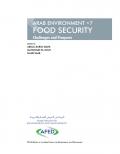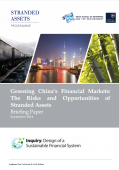
This policy brief focuses on large hydropower infrastructure in sub-Saharan Africa. It investigates the climate change risks and the use of climate services in decision-making and makes recommendations for actions to enhance the resilience of hydropower schemes. It summarises a more comprehensive paper prepared to support the scoping phase of the Future Climate for Africa (FCFA) programme for the hydropower sector.

Studying the roles of governments in adopting green innovations is significant for analysing the transition to a more sustainable energy system. This article presents a comparative study of policies for popularizing domestic solar water heaters in three countries: China, Israel and Australia. Expanding the analysis beyond the economics of innovation, it demonstrates the institutional dimension of green technology deployment in these three countries. By examining the diverging roles of governments in facilitating green technology adoption in existing social routines and practices, it finds that governments' motivations, support and implementation mechanisms are remarkably different in these three countries. In particular, the paper argues that solar water heater popularization has been distinguished as a business opportunity in China, energy security in Israel and environmental responsibility in Australia. In addition, the institutional settings have a real impact on governments' roles in adopting green innovations, in terms of the policy instruments chosen and implementation mechanisms.

